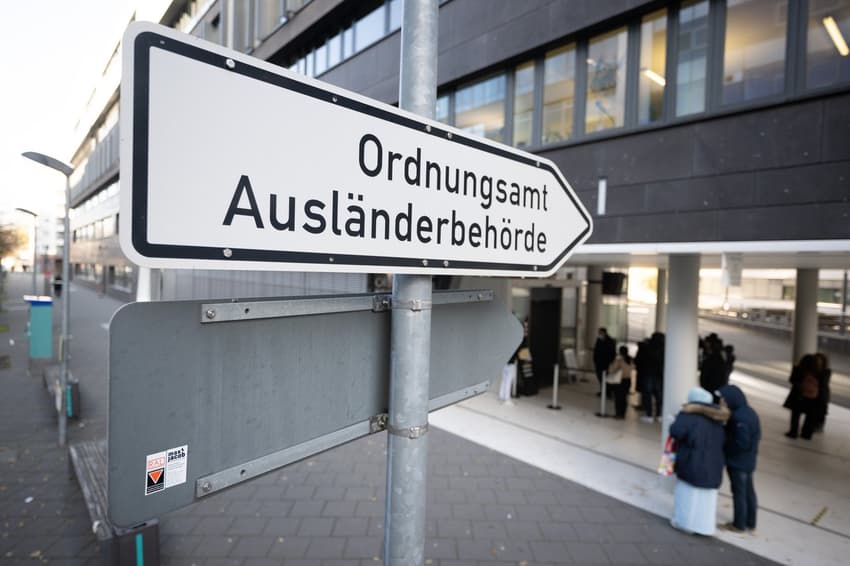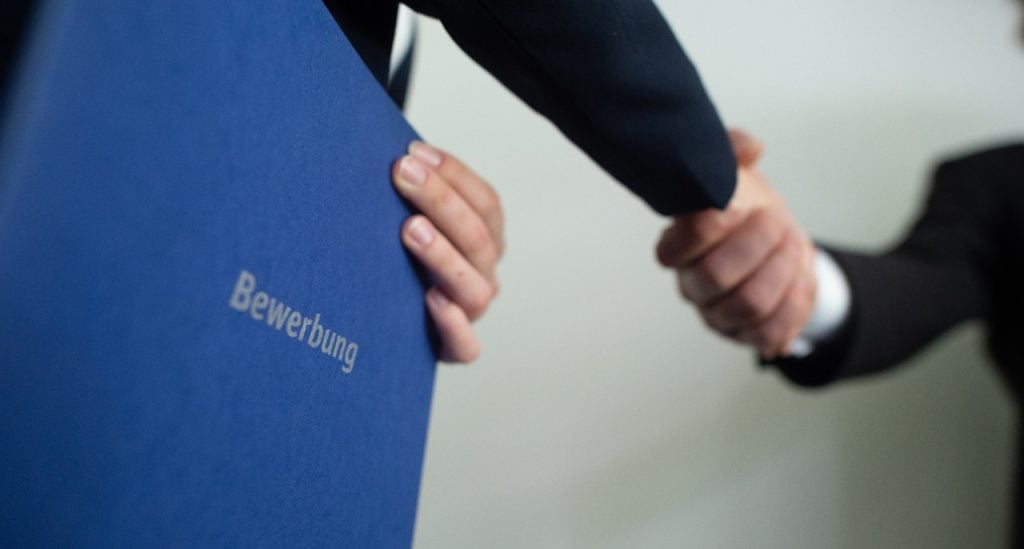What happens to your work permit if you lose your job in Germany?

Losing a job can be a scary experience - especially for people living in Germany on a work-based permit. Luckily, though, getting laid off doesn't always have to mean getting on the first flight home.
In tough economic times, layoffs are unfortunately a fact of life. You can feel settled in your job, enjoying life in a new country, and then suddenly find yourself facing unemployment and uncertainty.
If that happens, it's important to know the right steps to take to ensure you don't end up losing your right to stay in Germany. This partly depends on your nationality and the type of visa you have.
For EU, EEA and Swiss citizens, the situation is relatively simple. People from these countries don't require a permit to live and work in Germany and can simply sign on to either Arbeitlosengeld I (unemployment insurance) or Arbeitslosengeld II (long-term unemployment benefits) until they're back on their feet.
For non-EU citizens who rely on a residence permit to live in Germany, however, things are a little trickier.
You'll need to understand what you're entitled to and communicate with the relevant authorities to ensure your permit stays valid and you're given the time you need to find a new job.
How does losing your job affect your visa?
If you lose your job in Germany while here on a work permit, your visa doesn't automatically expire, but there are a few steps you'll need to take right away to ensure that it doesn't become invalid.
Firstly, you'll need to get in touch with your local Foreigners' Office, or Ausländerbehörde, in order to tell them your circumstances have changed.
According to the German Residence Act, you need to do this within two weeks of hearing that your working contract will end sooner than expected.
Don't worry about giving too many details of what has happened: the authorities simply need to be able to identify you and have confirmation of the date at which your employment ended.
READ ALSO: EXPLAINED: What you should know if you want to quit your job in Germany
That means a simple letter detailing your name, nationality and date of birth and the date of termination should suffice, along with the official termination letter from your employer. Ideally, this should be sent via email or post to the Ausländerbehörde you normally deal with.
Once the Foreigners' Office are aware that you're no longer employed, they will change the expiry date on your visa. This will give you a certain amount of time to find a new position after losing your old one.
How long do I have to look for a new job?
The amount of time you have to look for a new job slightly depends on your Ausländerbehörde, but six months is relatively standard, with three months being the absolute minimum.
In exceptional circumstances, you may even get as many as twelve months - though this is a rarity and again up to the discretion of the case workers.
The clock starts generally starts ticking the day your employment relationship ends, so don't hang around too long enjoying a life of lie-ins and late brunches.
According to career coach Chris Pyak, who helps foreigners break into the German job market, people from other countries often don't account for the delays they may face when dealing with German bureaucracy.

An employer and employee shake hands after a job interview. Photo: picture alliance/dpa/dpa-tmn | Klaus-Dietmar Gabbert
"The number one mistake that I see is that people let too much time go by before they apply a systematic approach to their job-hunt," he said. "And they wait way to long before seeking help if they just keep getting rejections."
Though six months may sound like a long time, there can often be lengthy delays even after you've got that all-important job offer. This can add at least another couple of months to the entire process, Pyak explained.
"Jobseekers need to keep in mind that German HR departments work very slowly," he added. "It is very common that you need two months to get a contract after a company has already decided that they'll hire you."
Can I claim benefits during this time?
In most cases, yes - but only a very specific type.
If you've been employed in Germany for 12 months in the last 30, that means you'll have racked up enough unemployment insurance contributions to be eligible for Arbeitslosengeld I (ALG I), or short-term unemployment benefit.
These contributions will have been taken out of your salary monthly and entitle you to up to 12 months of unemployment insurance payments. These amount to 60 percent of your previous salary each month, or 67 percent if you have kids.
READ ALSO: Reader question: Can I still get German citizenship after claiming benefits?
Bear in mind that if you take severance pay, you may waive your right to ALG I for up to three months, so you may have to make some careful calculations before accepting a severance offer.
If you're not entitled to ALG I, it's best to try and negotiate the best severance package you can, as non-EU citizens who are on temporary permits aren't entitled to longer-term unemployment benefits, i.e. Arbeitslosengeld II (ALG II).
What happens once I find a new job?
Since most work permits are dependent on a specific working relationship between you and your employer, you will usually need permission from the Ausländerbehörde to start a new job.
"When changing jobs, employees with a residence title are required to contact the competent foreigners authority," Christian Westermann, lawyer and labour law specialist at the law firm Rose & Partner in Hamburg, said in a statement. "Otherwise, the title may expire and they may have to return to their home country."
In some cases, like with the EU Blue Card, your job may need to meet a certain salary threshold to be suitable. In other cases, the Foreigners' Office may want to check that it is in a relevant field and matches your qualifications.

A job applicants works on their CV. Photo: picture alliance/dpa/dpa-tmn | Christin Klose
READ ALSO: What happens to your EU Blue Card if you lose your job in Germany?
There are two situations in which you won't have to ask permission from the Foreigners' Office and can simply email them a copy of your new contract once you receive it:
- If you've been on your current working visa for at least two years, or,
- If you've been in Germany on any type of visa for at least three years (though time spent studying only counts as half).
Once the Foreigners' Office accepts your request to change employer, you will need to switch to a new residence permit that is linked to this employment relationship. This can take another few months.
What if I don't find a new job?
If you don't find a new job within the allotted time, you will usually have to leave Germany before your residence permit expires.
However, there are some other options for staying the country, such as finding a university or language course to study on or having your spouse apply for a family reunification visa.
A qualified immigration lawyer can talk you through your options, or you can conduct some research yourself online.
READ ALSO: How to get fast-track permanent residency rights in Germany
In any case, it's important to apply for any extensions or changes with plenty of time before your current visa expires. That will avoid accidentally overstays that could result in an order to leave the country.
If you do end up leaving, it can take several months to be able to return to Germany. That's because you will have to continue your job search outside of the country and start the process of visa and residence permit applications once again from scratch.
Comments
See Also
In tough economic times, layoffs are unfortunately a fact of life. You can feel settled in your job, enjoying life in a new country, and then suddenly find yourself facing unemployment and uncertainty.
If that happens, it's important to know the right steps to take to ensure you don't end up losing your right to stay in Germany. This partly depends on your nationality and the type of visa you have.
For EU, EEA and Swiss citizens, the situation is relatively simple. People from these countries don't require a permit to live and work in Germany and can simply sign on to either Arbeitlosengeld I (unemployment insurance) or Arbeitslosengeld II (long-term unemployment benefits) until they're back on their feet.
For non-EU citizens who rely on a residence permit to live in Germany, however, things are a little trickier.
You'll need to understand what you're entitled to and communicate with the relevant authorities to ensure your permit stays valid and you're given the time you need to find a new job.
How does losing your job affect your visa?
If you lose your job in Germany while here on a work permit, your visa doesn't automatically expire, but there are a few steps you'll need to take right away to ensure that it doesn't become invalid.
Firstly, you'll need to get in touch with your local Foreigners' Office, or Ausländerbehörde, in order to tell them your circumstances have changed.
According to the German Residence Act, you need to do this within two weeks of hearing that your working contract will end sooner than expected.
Don't worry about giving too many details of what has happened: the authorities simply need to be able to identify you and have confirmation of the date at which your employment ended.
READ ALSO: EXPLAINED: What you should know if you want to quit your job in Germany
That means a simple letter detailing your name, nationality and date of birth and the date of termination should suffice, along with the official termination letter from your employer. Ideally, this should be sent via email or post to the Ausländerbehörde you normally deal with.
Once the Foreigners' Office are aware that you're no longer employed, they will change the expiry date on your visa. This will give you a certain amount of time to find a new position after losing your old one.
How long do I have to look for a new job?
The amount of time you have to look for a new job slightly depends on your Ausländerbehörde, but six months is relatively standard, with three months being the absolute minimum.
In exceptional circumstances, you may even get as many as twelve months - though this is a rarity and again up to the discretion of the case workers.
The clock starts generally starts ticking the day your employment relationship ends, so don't hang around too long enjoying a life of lie-ins and late brunches.
According to career coach Chris Pyak, who helps foreigners break into the German job market, people from other countries often don't account for the delays they may face when dealing with German bureaucracy.

"The number one mistake that I see is that people let too much time go by before they apply a systematic approach to their job-hunt," he said. "And they wait way to long before seeking help if they just keep getting rejections."
Though six months may sound like a long time, there can often be lengthy delays even after you've got that all-important job offer. This can add at least another couple of months to the entire process, Pyak explained.
"Jobseekers need to keep in mind that German HR departments work very slowly," he added. "It is very common that you need two months to get a contract after a company has already decided that they'll hire you."
Can I claim benefits during this time?
In most cases, yes - but only a very specific type.
If you've been employed in Germany for 12 months in the last 30, that means you'll have racked up enough unemployment insurance contributions to be eligible for Arbeitslosengeld I (ALG I), or short-term unemployment benefit.
These contributions will have been taken out of your salary monthly and entitle you to up to 12 months of unemployment insurance payments. These amount to 60 percent of your previous salary each month, or 67 percent if you have kids.
READ ALSO: Reader question: Can I still get German citizenship after claiming benefits?
Bear in mind that if you take severance pay, you may waive your right to ALG I for up to three months, so you may have to make some careful calculations before accepting a severance offer.
If you're not entitled to ALG I, it's best to try and negotiate the best severance package you can, as non-EU citizens who are on temporary permits aren't entitled to longer-term unemployment benefits, i.e. Arbeitslosengeld II (ALG II).
What happens once I find a new job?
Since most work permits are dependent on a specific working relationship between you and your employer, you will usually need permission from the Ausländerbehörde to start a new job.
"When changing jobs, employees with a residence title are required to contact the competent foreigners authority," Christian Westermann, lawyer and labour law specialist at the law firm Rose & Partner in Hamburg, said in a statement. "Otherwise, the title may expire and they may have to return to their home country."
In some cases, like with the EU Blue Card, your job may need to meet a certain salary threshold to be suitable. In other cases, the Foreigners' Office may want to check that it is in a relevant field and matches your qualifications.

READ ALSO: What happens to your EU Blue Card if you lose your job in Germany?
There are two situations in which you won't have to ask permission from the Foreigners' Office and can simply email them a copy of your new contract once you receive it:
- If you've been on your current working visa for at least two years, or,
- If you've been in Germany on any type of visa for at least three years (though time spent studying only counts as half).
Once the Foreigners' Office accepts your request to change employer, you will need to switch to a new residence permit that is linked to this employment relationship. This can take another few months.
What if I don't find a new job?
If you don't find a new job within the allotted time, you will usually have to leave Germany before your residence permit expires.
However, there are some other options for staying the country, such as finding a university or language course to study on or having your spouse apply for a family reunification visa.
A qualified immigration lawyer can talk you through your options, or you can conduct some research yourself online.
READ ALSO: How to get fast-track permanent residency rights in Germany
In any case, it's important to apply for any extensions or changes with plenty of time before your current visa expires. That will avoid accidentally overstays that could result in an order to leave the country.
If you do end up leaving, it can take several months to be able to return to Germany. That's because you will have to continue your job search outside of the country and start the process of visa and residence permit applications once again from scratch.
Join the conversation in our comments section below. Share your own views and experience and if you have a question or suggestion for our journalists then email us at [email protected].
Please keep comments civil, constructive and on topic – and make sure to read our terms of use before getting involved.
Please log in here to leave a comment.